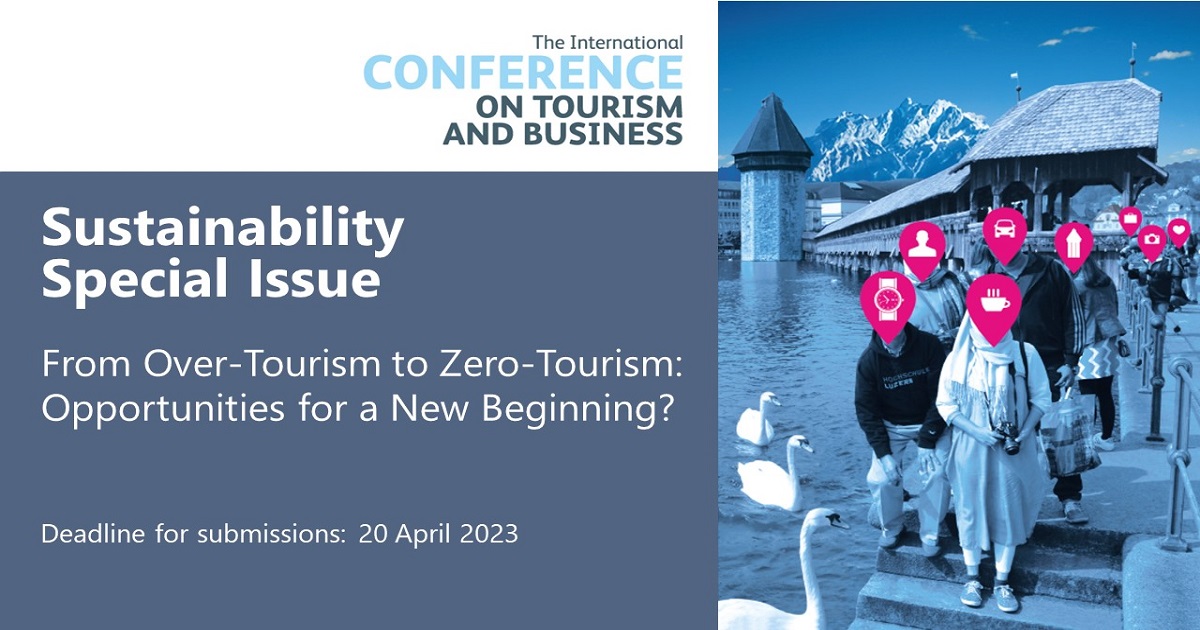From Over-Tourism to Zero-Tourism: Opportunities for a New Beginning?
A special issue of Sustainability (ISSN 2071-1050). This special issue belongs to the section "Tourism, Culture, and Heritage".
Deadline for manuscript submissions: closed (30 October 2023) | Viewed by 42458

Special Issue Editors
Interests: transportation studies; sustainability studies; quantitative statistics; tourism
Special Issues, Collections and Topics in MDPI journals
Special Issue Information
Dear Colleagues,
The COVID-19 pandemic is an external shock that struck the global travel industry. How tourism will evolve in the post-pandemic world is still unknown, and this creates an interesting research field. External shocks with enormous negative effects on international tourism that have previously been studied in academia include disasters such as the SARS epidemic (Page et al., 2006), the Ebola epidemic (Mizrachi and Fuchs, 2016), the financial crisis of 2008 (Smeral, 2009), and the Arab Spring of 2010 (Perles-Ribes et al., 2017). Other crises include terrorist attacks such as 9/11 (Kosová and Enz, 2012) or the bombings in Bali (Gurtner, 2016), as well as natural disasters such as earthquakes (Wearing et al., 2020) or the Australian bushfires (Schweinsberg et al., 2020). Each crisis provided not only negative effects, but also opportunities for change, and—from a research perspective—new knowledge about coping strategies, as well as possible future scenarios for the tourism industry.
This Special Issue “From Over-Tourism to Zero-Tourism: Opportunities for a New Beginning?” addresses key changes and current opportunities in tourism and business, covering a wide range of topics related to negative external shock caused by the COVID-19 pandemic. In this Special Issue, we aim to cover both tourism demand and supply. Selected papers may address the issues of changes in demand; for instance, tourists' cognitive, emotional, and behavioural reactions for negative shock; shifts in consumer behaviour and changes in travel behaviour; characteristics of a crisis and resulting changes in demand. Authors are welcome to submit papers on coping strategies from different perspectives, and focus on crisis management in tourism, structural changes in the global tourism and hospitality sectors, public measures to promote tourism after crises, (sustainable) recovery strategies for the tourism industry, or strategies for the crisis preparedness of tourist destinations. We also invite papers that engage with the impact of the pandemic on sustainable tourism, answering the questions about the long-term effects of COVID-19 and the future of responsible and sustainable tourism after the crisis. This Special Issue also aims to cover the broad topic of current and future opportunities for the tourism industry; for example, in the form of adaptation and reinvention of business models with a focus on hygiene issues, as well as non-pharmaceutical interventions.
This Special Issue will include extended and enriched versions of selected peer-reviewed papers presented at the 4th International Conference on Tourism and Business (ICTB) (https://www.hslu.ch/en/lucerne-school-of-business/research/conferences/ictb). The conference will be held in Lucerne, Switzerland, 24-27 August 2022. The 4th International Conference on Tourism and Business (ICTB) will be jointly organised by the Lucerne University of Applied Sciences and Arts (Switzerland), Mahidol University International College (Thailand), and Edinburgh Napier University (Scotland).
We welcome papers concentrating on local, regional and international perspectives on tourism recovery and resilience, with special attention to comparison of different regions of countries. This Special Issue accepts both theoretical papers and empirical research papers using qualitative methods, quantitative methods, and mixed-methods research.
Prof. Dr. Timo Ohnmacht
Dr. Anna Para
Guest Editors
Manuscript Submission Information
Manuscripts should be submitted online at www.mdpi.com by registering and logging in to this website. Once you are registered, click here to go to the submission form. Manuscripts can be submitted until the deadline. All submissions that pass pre-check are peer-reviewed. Accepted papers will be published continuously in the journal (as soon as accepted) and will be listed together on the special issue website. Research articles, review articles as well as short communications are invited. For planned papers, a title and short abstract (about 250 words) can be sent to the Editorial Office for assessment.
Submitted manuscripts should not have been published previously, nor be under consideration for publication elsewhere (except conference proceedings papers). All manuscripts are thoroughly refereed through a single-blind peer-review process. A guide for authors and other relevant information for submission of manuscripts is available on the Instructions for Authors page. Sustainability is an international peer-reviewed open access semimonthly journal published by MDPI.
Please visit the Instructions for Authors page before submitting a manuscript. The Article Processing Charge (APC) for publication in this open access journal is 2400 CHF (Swiss Francs). Submitted papers should be well formatted and use good English. Authors may use MDPI's English editing service prior to publication or during author revisions.
Keywords
- tourism
- external shock
- COVID-19
- resilience
- crisis management
Benefits of Publishing in a Special Issue
- Ease of navigation: Grouping papers by topic helps scholars navigate broad scope journals more efficiently.
- Greater discoverability: Special Issues support the reach and impact of scientific research. Articles in Special Issues are more discoverable and cited more frequently.
- Expansion of research network: Special Issues facilitate connections among authors, fostering scientific collaborations.
- External promotion: Articles in Special Issues are often promoted through the journal's social media, increasing their visibility.
- Reprint: MDPI Books provides the opportunity to republish successful Special Issues in book format, both online and in print.
Further information on MDPI's Special Issue policies can be found here.






